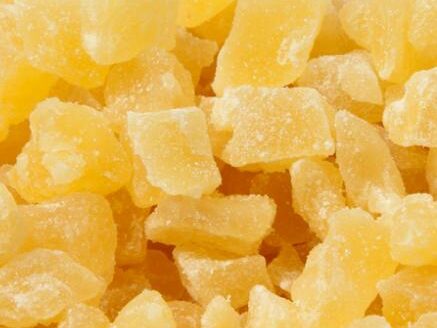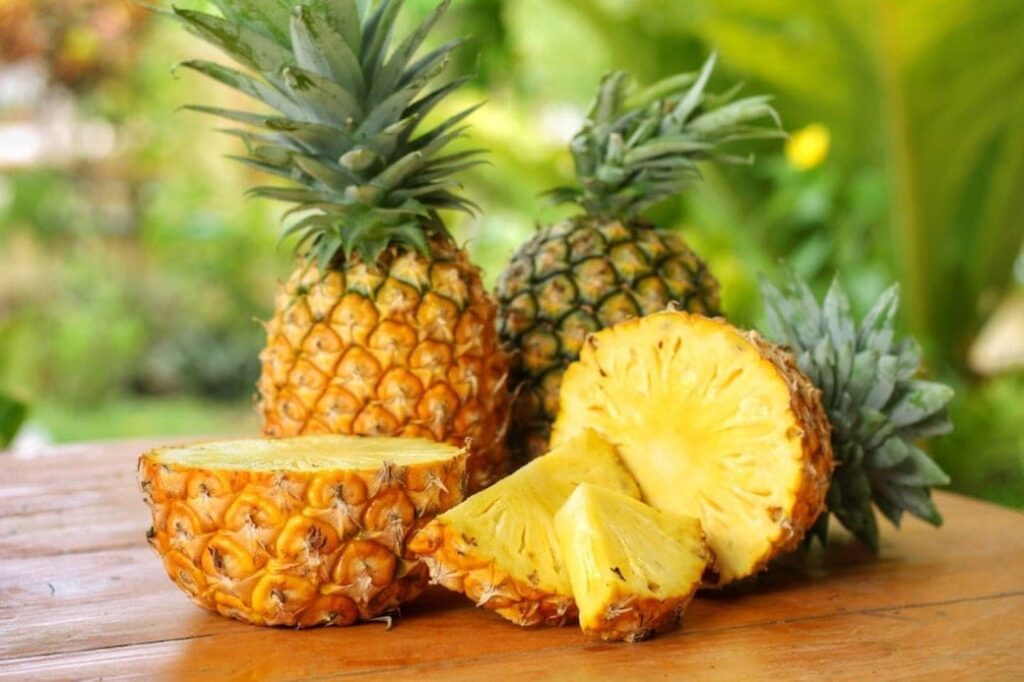Are Dried Pineapples Good For You – Benefits, Nutrition & Risks!
Yes, dried pineapple contains antioxidants, fiber, and vitamins that improve immunity and aid with digestion. To cut back on calories and sugar, choose without sugar, sulfite free varieties and consume them in moderation.
When it comes to tropical snacks, dried pineapple often ranks high on the list for its sweet taste and chewy texture. But many people wonder, are dried pineapples good for you? The answer isn’t just a simple “yes” or “no.” Like most dried fruits, they have both benefits and potential drawbacks, depending on how they are made and consumed.
In this guide, we’ll explore dried pineapple health benefits, nutrition facts, and whether dried pineapple is healthy for your lifestyle and diet goals.
What is Dried Pineapple?
Dried pineapple is made by removing most of the water content from fresh pineapple through air drying, sun drying, or using a dehydrator. This process concentrates its natural enzymes in pineapple, making it more flavorful and sweeter.
Some dried pineapples are sold unsweetened, while others have added sugar, which can significantly change their health value.
Dried Pineapple Nutrition Facts

Knowing dried pineapple nutrition facts helps you make better dietary choices. On average, a 40g serving of unsweetened dried pineapple contains:
- Calories: ~140–160
- Carbohydrates: 35–38g
- Sugars: 25–30g (naturally occurring, but can be higher with added sugar)
- Fiber: 2–3g (fiber content in dried pineapple helps digestion)
- Vitamin C: Reduced compared to fresh pineapple due to heat exposure
- Manganese: Vital for metabolism and bone health
💡 Tip: Check the label for “no added sugar” to avoid excessive dried pineapple sugar content.
Dried Pineapple Health Benefits
When consumed in moderation, dried pineapple offers several tropical dried fruits health benefits:
- Rich in Antioxidants: Pineapple contains antioxidant properties that help fight oxidative stress and may reduce inflammation.
- Good Source of Fiber: The fiber content in dried pineapple supports digestion, keeps you feeling full longer, and helps regulate bowel movements.
- Contains Bromelain: Bromelain benefits in pineapple include improved digestion of protein, reduced swelling, and potential anti inflammatory effects.
- A Convenient Healthy Snack Alternative: Unlike fresh pineapple, dried pineapple doesn’t require refrigeration, making it a healthy snack alternative when you’re on the go.
Is Dried Pineapple Healthy?
The big question: is dried pineapple healthy? The type and serving size determine the response.
- Unsweetened dried pineapple: Generally healthy in moderation, especially when used as part of a balanced diet.
- Sweetened dried pineapple: Often contains added sugars, which can make it fattening and raise blood sugar levels.
For most people, moderate consumption supports health, but excessive intake may contribute to weight gain.
Dried Pineapple vs Fresh Pineapple
When comparing dried pineapple vs fresh pineapple, there are clear differences:
| Aspect | Fresh Pineapple | Dried Pineapple |
| Water Content | High | Low |
| Calories per 100g | ~50 | ~250–300 |
| Vitamin C | High | Lower (heat loss) |
| Sugar Concentration | Lower | Higher |
| Storage | Short term | Long shelf life |
Conclusion: Fresh pineapple offers more hydration and vitamin C, while dried pineapple is more calorie-dense.
Potential Downsides & Health Risks
While dried pineapple can be nutritious, it’s important to know the potential drawbacks:
- High sugar in dried fruit can cause blood sugar spikes.
- The impact of dried fruit on blood sugar is greater for people with insulin resistance or diabetes.
- Is dried pineapple bad for your teeth? Yes, if eaten frequently without proper oral care, the sticky sugar can promote tooth decay.
- Is dried pineapple fattening? It can be consumed in large amounts due to its calorie density.
Is Dried Pineapple Good for Weight Loss?
Many people ask, is dried pineapple good for weight loss?
- It can be if eaten in controlled portions.
- High fiber keeps you full, but high sugar can slow progress if overconsumed.
- Used as an occasional sweet snack rather than a daily staple.
Can Diabetics Eat Dried Pineapple?

Can diabetics eat dried pineapple? Yes, but with strict portion control and only if it’s unsweetened. The impact of dried fruit on blood sugar is significant, so pairing it with nuts or protein can help slow sugar absorption.
Portion Control & Healthy Ways to Eat Dried Pineapple
To enjoy the benefits of dried pineapple without overdoing it:
- Limit to 30–40g per serving (about a small handful).
- Choose unsweetened, unsulfured versions.
- Combine with seeds and nuts for a well rounded snack.
- Use as a topping for yogurt, oatmeal, or salads for flavor without excess sugar.
How Much Dried Pineapple Should You Eat?
For most people, a healthy serving of dried pineapple is about 30–40 grams roughly a small handful two to three times per week. This keeps your sugar and calorie intake within healthy limits while still allowing you to enjoy its fiber, bromelain, and antioxidant properties.
Choosing unsweetened, unsulfured dried pineapple and practicing portion control ensures you gain the health benefits without the risks of weight gain or blood sugar spikes.
FAQs:
1. Can dried pineapple help with digestion?
Yes, dried pineapple contains fiber and bromelain, which aid digestion. However, it’s calorie-dense, so enjoy small portions to benefit your gut health without consuming excess sugar.
2. Is dried pineapple suitable for diabetics?
Unsweetened dried pineapple can be eaten in small amounts by diabetics. Pairing it with protein or healthy fats may help reduce its impact on blood sugar levels.
3. Does dried pineapple have vitamin C?
Yes, but significantly less than fresh pineapple due to heat loss during drying. It still offers other nutrients like manganese and antioxidants, making it beneficial in moderation.
4. Can dried pineapple cause weight gain?
If eaten in large portions, yes. Dried pineapple is calorie-dense and high in sugar, so overeating can lead to weight gain. Stick to a small handful per serving.
5. What’s the healthiest way to eat dried pineapple?
Choose unsweetened, unsulfured dried pineapple and combine it with nuts or seeds. This helps balance sugar absorption while boosting nutritional value for a more satisfying, healthy snack.
Conclusion
Dried pineapple can be a tasty, nutrient rich snack when enjoyed in moderation. Packed with fiber, antioxidants, and bromelain, it supports digestion and overall health. However, its concentrated sugars and calories mean portion control is essential especially for those managing weight or blood sugar levels. Choosing unsweetened, unsulfured varieties enhances its benefits while reducing health risks. Whether eaten alone or in a mix with other snacks, dried pineapple can be part of a balanced diet if consumed mindfully.






